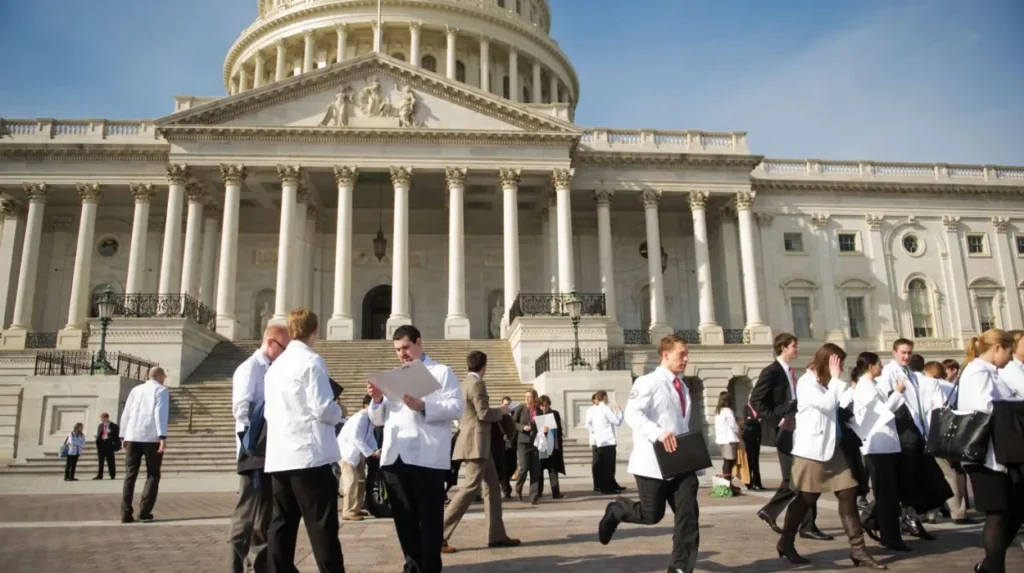The number of lobbyists in Washington, D.C., is estimated to be over 12,000 registered professionals who actively engage in advocating on behalf of various interest groups, corporations, nonprofits, and government entities. However, the actual number of working lobbyists, including unregistered or “underground” lobbyists, is estimated to be much higher, possibly approaching 100,000 individuals. Most lobbying activity and expenditures are handled by fewer than 300 firms, reflecting the concentrated nature of influence within the capital.
Lobbying in Washington, D.C., represents a well-established industry focused on influencing legislation, regulatory policies, and government decisions. These lobbyists interact primarily with members of Congress, executive agencies, and sometimes judicial appointees, aiming to advance the interests of their clients through persuasion, information dissemination, and coalition-building.
While the number of registered lobbyists has shown some fluctuations over the years, the overall lobbying activity has increased, partly due to more sophisticated strategies to influence policy. The industry generates billions of dollars annually, with corporations and large trade groups constituting the primary clients. Some reports highlight Wall Street spending record sums on lobbying efforts during election cycles.
Lobbying takes place at every level of government, including federal, state, municipal, and local levels. However, Washington, D.C., remains the epicenter, especially for federal lobbying targeting Congress and federal agencies. Lobbying efforts can focus on a wide variety of issues, including health care, finance, energy, technology regulation, and foreign policy. Lobbyists may engage in “inside lobbying” (direct contact with legislators and aides) as well as “outside” or grassroots lobbying, which includes mobilizing public opinion or using media campaigns.
This intricate network of registered and unregistered lobbyists, combined with the significant financial resources deployed, has made lobbying a critical and often controversial feature of the American political landscape.
Estimated Number of Lobbyists in Washington, D.C.
Official records suggest there are over 12,000 registered lobbyists operating in Washington, D.C., at any given time. However, these numbers only capture those formally registered under federal law. Experts and analysts estimate the actual total of individuals engaged in lobbying-related activities including unregistered or “shadow” lobbyists could be as high as 100,000. This discrepancy arises because not all individuals engaging in lobbying activities meet the registration thresholds or choose to register, while others operate informally.
Among the thousands of lobbyists, fewer than 300 firms dominate the landscape by managing the bulk of lobbying expenditures. These firms employ seasoned professionals who cultivate extensive networks within Congress, federal agencies, and the executive branch. They represent a wide range of interests from influential multinational corporations to industry associations, unions, advocacy groups, and foreign governments.
The Scope and Focus of Lobbying Efforts
Lobbyists seek to influence legislation, regulations, judicial appointments, and policy decisions across various issues. While many lobbyists are focused on Congress both the House of Representatives and the Senate they also target executive agencies like the Treasury Department, the Securities and Exchange Commission, and even the Supreme Court.
The interests represented are diverse, ranging from finance, healthcare, energy, technology, defense, to social and environmental issues. Lobbyists often specialize in certain sectors or policy areas, developing expertise and long-standing relationships with policymakers. Corporations and trade associations constitute the largest spenders in lobbying, often employing multiple lobbyists to advocate across different policy arenas.
How Lobbying Operates in Washington, D.C.
Lobbying in Washington involves direct contact with legislators and their staff, known as inside lobbying, as well as indirect methods including public relations campaigns and lobbying through grassroots mobilization. Lobbyists arrange meetings, provide specialized policy expertise, draft legislative language, and assist lawmakers in navigating complex regulatory environments.
Most lobbyists are former government staffers or seasoned policy experts who leverage their knowledge and connections to effectively navigate the halls of power. The strength of a lobbying firm often lies in its access, credibility, and ability to build coalitions that amplify their clients’ voices.
Economic and Political Significance
The lobbying industry in Washington is a multibillion-dollar business. It has grown exponentially since the 1970s and shapes public policy in profound ways. Analysts highlight that lobbying expenditures have reached billions annually, with some of the most influential sectors being finance, healthcare, energy, and technology.
Lobbyists also play a role in the electoral process by helping arrange campaign donations, fundraisers, and political action committee (PAC) contributions. These activities underscore the interconnectedness of lobbying with broader political financing within the U.S. system.
Controversies and Public Perceptions
Lobbying carries significant public scrutiny and criticism, often viewed as undue influence or “corporate bribery” by critics who argue it undermines democratic principles. The complexity and opacity of lobbying activities, combined with large sums of money spent on influencing policy, raise concerns about equity and access.
Nevertheless, lobbying is legally protected under the First Amendment as a form of free speech and petitioning the government. The challenge remains in balancing transparency, regulation, and the legitimate role of advocacy in democracy.
Washington, D.C., is home to over 12,000 registered lobbyists, with hundreds of firms orchestrating a powerful and extensive lobbying industry. This network exerts significant influence on American policymaking, representing a wide array of interests and shaping legislation, regulation, and governance at the highest levels. Understanding the scope and scale of lobbying in the nation’s capital is essential to grasping the broader dynamics of U.S. political power and influence.







